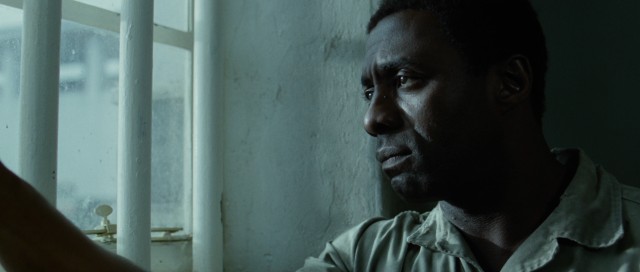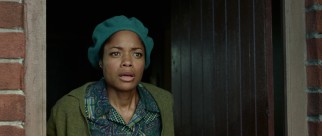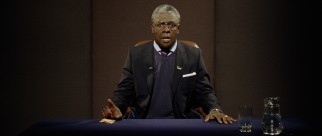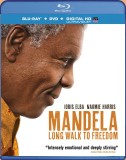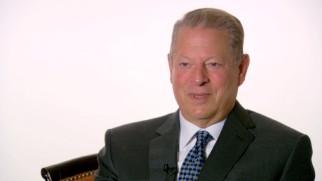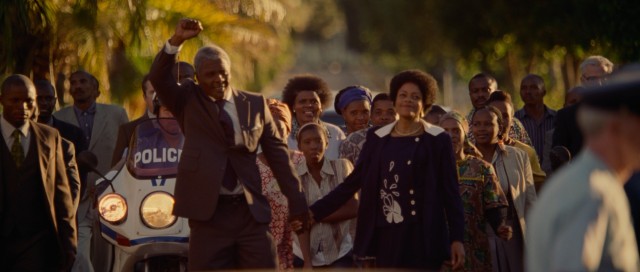Mandela: Long Walk to Freedom Blu-ray + DVD + Digital HD UltraViolet Review
 |
Mandela: Long Walk to Freedom
Theatrical Release: November 29, 2013 / Running Time: 141 Minutes / Rating: PG-13 Director: Justin Chadwick / Writers: William Nicholson (screenplay); Nelson Mandela (autobiography Long Walk to Freedom) Cast: Idris Elba (Nelson Mandela), Naomie Harris (Winnie Madikizela), Tony Kgoroge (Walter Sisulu), Riaad Moosa (Ahmed Kathrada), Zolani Mkiva (Raymond Mhlaba), Simo Mogwaza (Andrew Mlangeni), Fana Mokoena (Govan Mbeki), Thapelo Mokoena (Elias Motsoaledi), Jamie Bartlett (James Gregory), Deon Lotz (Kobie Coetzee), Terry Pheto (Evelyn Mase), Lindiwe Matshikiza (Zindzi Mandela 28-32 Years) |
Buy Mandela: Long Walk to Freedom from Amazon.com: Blu-ray Combo Blu-ray DVD Instant Video
Even after the inspired casting of Morgan Freeman, one major motion picture about Nelson Mandela wasn't going to be enough, especially when that one, 2009's Invictus, Bigger things were expected of Mandela: Long Walk to Freedom, a film backed by the Weinsteins and starring Idris Elba whose ambitions were clear from its scheduled post-Thanksgiving opening and Christmas Day expansion. Hailing from Gladiator and 2012's Les Misιrables screenwriter William Nicholson and The Other Boleyn Girl director Justin Chadwick, this Mandela seemed like a surefire award season force. But it would have to settle for a Best Original Song loss at the Oscars and little other recognition of note outside the Golden Globes.
More of a traditional biopic, Mandela opens in Johannesburg in 1942, where Mandela (Elba) is a practicing attorney and playboy bachelor. As racial hostilities and government-sanctioned segregation rises, Mandela finds his calling. Regrettably, that call to activism keeps him away from his wife and their young son. The marriage falls apart, but Mandela remains committed to resisting injustice. A charismatic speaker, he excites the people about their calls for freedom and equality, as he leads them to peacefully defy apartheid laws. He also finds love with Winnie (Naomie Harris), a social worker who becomes his second wife.
After police gun down 69 demonstrators, Mandela decides to amplify efforts, burning the ID his government requires him to carry. Deciding that nonviolent protest has become ineffective, Mandela and his party, the African National Congress (ANC), graduate to acts of sabotage, bombing vacant power plants and municipal offices. Mandela and his colleagues are eventually caught by authorities and put on trial in the 1960s. Willing to die as a possible verdict, Mandela and the others are instead sentenced to life in prison.
We follow them into incarceration, which begins depressingly enough with Mandela confined to a small solitary cell on Robben Island and limited to receiving one heavily redacted piece of mail from home every so often. Back home, Winnie's hate for her persecutors rises and lands her 16 months in solitary confinement.
Over the next 26 years Mandela spends behind bars, his jail conditions gradually improve from the days of hard labor, demeaning shorts, and random middle of the rainy night inspections to a house all to himself at which his extended family can visit him at any time. Eventually, the people's cries for his release cannot be ignored. South Africa's President offers Mandela a release if he will denounce violent protest. The patient Mandela refuses to be made a pawn, but does recognize the value of compromise as his dream of living in a free and peaceful South Africa.
Critics gave Mandela mixed reviews, which is perhaps to be expected when dealing with such a significant and relatively recent subject as this world leader who passed away shortly before the film's nationwide expansion. The film seems modeled after epic biopics like Gandhi, which don't have the power and intrigue they once did. Still, Mandela is a well-made and well-performed biography. Without doing research, I cannot judge the film's accuracy, nor can I pretend to worry much about it. There doesn't seem to be a political agenda or revisionism to Nicholson's screenplay or Chadwick's direction. Mandela's autobiography, which gives the film its subtitle, is alone credited as the source text. I've not read that but I imagine that Nicholson has gone beyond it to write this story. He succeeds at humanizing this revered hero. It's surprising to the film not shying from depicting an extramarital affair or showing Mandela being less than gentle with his first wife. Surely, this can't be invention. Chadwick succeeds at finding ways to render Mandela's efforts cinematic. For instance, Mandela is seen interrupting an Elizabeth Taylor movie screening, speaking in front of the screen to capture his people's hearts. Rarely does the film resort to depicting unrest in grainy montage and archival footage.
Elba commands the screen with his performance. He gets Mandela's voice, a strange accent to our ears, down pat. The British actor is aided by impressive hair and make-up efforts. The latter seem a tad inconsistent, but still manage to convey the over 50 years that pass in the course of this film (although, Harris seems unrealistically spared aging). Elba's athletic physique also undermines the image he cuts as the convict turned grayed statesman approaching 70.
After not drumming up a great deal of interest in a 1,000-theater release, Mandela hit home video this week, in single-disc Blu-ray and DVD editions plus the two-disc Blu-ray + DVD + Digital HD UltraViolet combo pack reviewed here.
VIDEO and AUDIO Mandela is no television movie and that is apparent from this Blu-ray's potent picture and sound. The 2.40:1 visuals offer terrific detail and clarity. The 5.1 DTS-HD master audio mix impresses even more. This is a film that has poured much effort into sound design and the results are consistently pleasing. The aggressive mix engulfs you with atmosphere, while giving fitting weight to the always crisp dialogue.
BONUS FEATURES, MENUS, PACKAGING and DESIGN Mandela's extras begin with an audio commentary by director Justin Chadwick. Solo commentaries are rarely a fun time, but Chadwick does his best to give this value. He reveals himself to be an expert on Mandela and talks about the responsibility that came from being the official Mandela movie, the one having his autobiography's book rights. Video extras (all encoded in HD on the Blu-ray) begin with "Mandela: The Leader You Know, The Man You Didn't" (22:04), a featurette that's partly about the man and partly about the movie. Comments from the cast and filmmakers are complemented those from Mandela's fellow prisoners, African officials, and famous outside admirers, like Whoopi Goldberg and P. Diddy. Four behind-the-scenes featurettes (30:20) delve deeper into the following aspects of the film's making: production design, prosthetics & costuming, special effects, and soundtrack (both in terms of music and sound, but not touching U2's contributions). They're a tad technical for general consumption, but the efforts are worth paying notice.
Finally, we get a video gallery of seven tributes (16:20). Television journalists, politicians, and entertainers seen in the main featurette voice their appreciation of Mandela. Dan Rather, Al Gore, Robin Roberts, Tom Brokaw, The same one sold separately, the combo pack's DVD only includes the audio commentary and "The Leader You Know, The Man You Didn't" featurette, though it remains well under dual-layered disc capacity. The discs open with trailers for Lee Daniels' The Butler and Fruitvale Station. Neither is accessible by menu and Mandela's trailer isn't included at all, which is extra disappointing since it was a compelling preview. The basic main menu attaches score to a routine montage of screen-filling clips. Weinstein Blu-rays continue to remain oblivious to the fact that their lack of both resuming and bookmarking capabilities hinders the Blu-ray viewing experience. An insert supplying directions and a unique code for redeeming your Digital HD UltraViolet join the silver DVD and full-color Blu-ray inside a plain unslipcovered blue keepcase.
CLOSING THOUGHTS Failing to connect with audiences or be lavished with accolades, Mandela didn't live up to the part of a holiday season Weinstein Company biopic, but this well-intentioned, well-made drama deserves more credit than the mixed reviews it drew. Weinstein's combo pack delivers a wealth of bonus features, most of them substantial. Depending on your appreciation for the man whose story it tells, this could be a set worth owning and revisiting. Buy Mandela: Long Walk to Freedom from Amazon.com:
|
Related Reviews:
DVDizzy.com | DVD and Blu-ray Reviews | New and Upcoming DVD & Blu-ray Schedule | Upcoming Cover Art | Search This Site
Idris Elba: Pacific Rim 28 Weeks Later Thor Thor: The Dark World Prom Night Ghost Rider: Spirit of Vengeance
Tony Kgoroge: Invictus | Naomie Harris: Pirates of the Caribbean: Dead Man's Chest
Directed by Justin Chadwick: The Other Boleyn Girl | Written by William Nicholson: Elizabeth: The Golden Age
New: American Hustle Kill Your Darlings George Washington Frozen Saving Mr. Banks
The Iron Lady The Queen District 9 Lee Daniels' The Butler Fruitvale Station
The Help J. Edgar Perfect Harmony 42 Glory Road Remember the Titans
